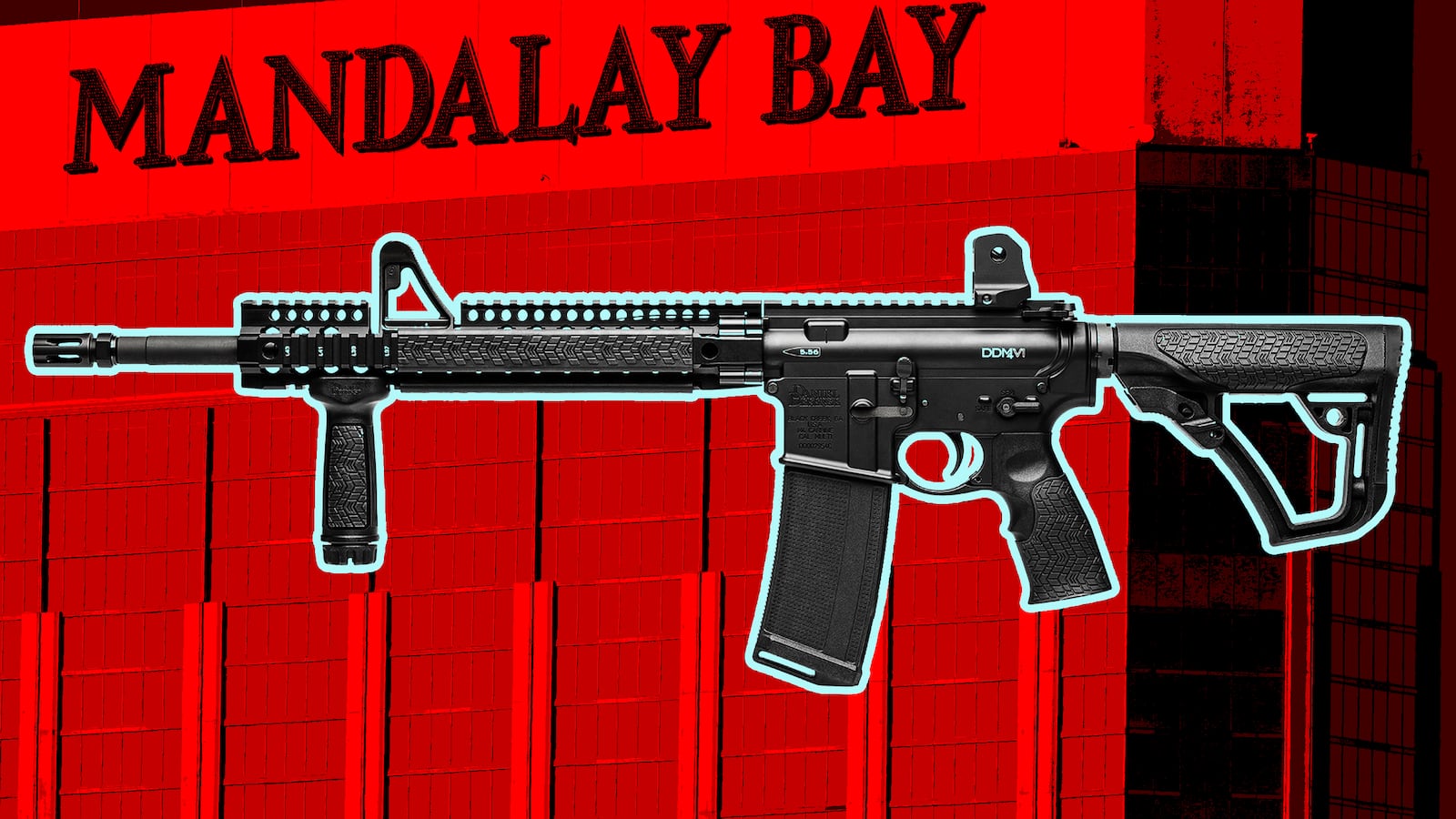Editor’s Note: James LaPorta is a former Marine infantryman and a military trained combat marksmanship instructor.
Stephen Paddock legally purchased rifles to kill 59 people in Las Vegas that are equal or superior to weapons used by the U.S. military.
The rifles Paddock used are so powerful and potentially prolific that he didn’t need training to inflict dozens of deaths and hundreds of injuries. What Paddock apparently lacked in experience he made up for with preparation, opportunity, and deadly accurate hardware.
Law enforcement recovered 23 firearms from the 32nd-floor suite of the Mandalay Bay Resort and Casino, including AR-15-style rifles. They are the equivalent of the U.S. military’s standard service rifle, the M-16. One the rifles seen in an unofficial photograph features a “free floating barrel,” unlike an M-16 whose barrel is connected to the rest of the rifle.
Inside a free-floating barrel, bullets travel without interference from micro-vibrations. Conversely, a bullet fired from a fixed barrel can be thrown off its intended trajectory by these external vibrations. The difference can be as much as 50 percent more accurate.
The U.S. Army and Marine Corps have been trying to outfit their conventional infantry forces with weapons that have free-floating barrels for years. In other words, Paddock’s weapons are more accurate by design than some of the weapons the U.S. military issues out to their regular infantry service members.
Another rifle with a free-floating barrel was mounted with a bipod, which is commonly used by snipers. In urban environments for example, military snipers position themselves well inside the room at some distance away from the window to conceal their muzzle flash, weapon, and themselves.
Paddock also outfitted his weapons with some of the best optics available to the public. One of the rifles laying on the floor appears to be a AR-frame model with a rail system to mount hardware such as a tactical flashlight or laser targeting sight, preferred by SWAT teams and Navy SEALs when using night vision.
Additionally, Paddock mounted what appears to be a military-grade EO Tech sight to his weapon. While this sight is not magnified, it gives an advantage to the shooter for faster target acquisition with the ability to calibrate the sight to multiple distances, making it easier to alternate between targets at both short and long ranges.
Another photo shows a rifle with an extended magazine capable of holding up to 100 rounds. High-capacity magazines like the one in Paddock’s weapon can be purchased online at websites like Stackin’ Bodies for $169. Nevada, where Paddock reportedly purchased most of his weapons, has no laws limiting magazine ammunition capacity.
At first, the loud crackling noise heard over country music sounded like fireworks. It was actually the sound of bullets breaking the sound barrier, and it means one thing for those who hear it: You’re far too close to the bullet’s final destination.
For those that have been baptized in warfare and combat, the God-awful noise is reminiscent of firefights from Afghanistan, like the ones I was in as a Marine infantryman, circa 2009. Yet, the gunmen’s position put him at an advantage over the crowd of innocents below who had little to no cover to hide behind.
“The meticulous and long term planning takes away from [the idea that] Paddock [was] having a psychotic break,” Army Green Beret Sgt. 1st Class Loren Schofield, who retired with 20 years of service with training in military intelligence, told The Daily Beast.
Paddock’s choice of an elevated position increased the likelihood of inflicting damage to the people below even if shots were fired inaccurately or if he had fired at the concert goers from the ground level, according to U.S. Army special forces soldiers that spoke with The Daily Beast.
The tactic within the U.S. military is known to machine gunners as “plunging fire” where bullets essentially rain down in a conical area versus a straight line if Paddock were on the same elevation as his targets. This means less bullets are needed to be used.
“There’s a reason we [in the military community] don’t shoot at full auto because it reduces the shooter’s ability to fire the weapon accurately,” said Tony Cowden, a U.S. Army Sergeant First Class special forces soldier, who formerly was on the CIA and Joint Special Operations Command mission to kill or capture Osama Bin Laden in 2001.
Despite his firing position from high above his targets, Paddock was not a sniper in the traditional sense of the word.
“The only time we shoot a fully automatic weapon is at an area target,” Cowden said. “Well guess what? A stadium full of people is an area target... it doesn’t take any training to do what he did.”
Automatic weapons in the United States have long been federally regulated and are more difficult to obtain than semi-automatic rifles. Las Vegas Metropolitan Police Department Sheriff Joseph Lombardo told reporters that Paddock had a bump stock on at least one rifle, making the semi-automatic weapon equivalent to a fully automatic rifle.
The duration of bursts from Paddock are contrary to the military’s techniques regarding automatic fire. Sustained rates of fire are hard to control even with the addition of tripods and a stable shooting platform.
Cowden says that Paddock’s rapid of fire at the crowd would eliminate the use of his magnified optical sight for aiming at individual people, Cowden said. Had Paddock actually fired slower, and used the sight, he could have killed even more people.
“I would argue that someone with decent training, not even a school-trained sniper or a long range shooter, someone who just understood the basics and fundamentals of marksmanship could have inflicted even more death,” Cowden said. “If he had been taking well-aimed shots, shooting every 5 seconds, you would have had more people dead than you do right now.”
Most AR-style weapons use the .223 ammunition cartridge, which is civilian equivalent of the U.S. military’s standard 5.56 x 45 mm NATO round. These rounds have enough energy to kill at between 4o0-600 yards, and Paddock was shooting from about 500 yards away.
“These days with precision rifles, a 1,000-meter shot with a AR weapon system is not hard,” Cowden said.
Cowden’s assessment of Paddock’s marksmanship was lamented by Army Green Beret Schofield.
“He’s the exact opposite of a sniper,” Schofield said. “His rate of fire his suppressive, not precision. He didn’t have to worry about range, angle, wind adjustments. Just aim for the middle of the mass and fire as quickly as possible.”
Correction: 10/5/17: A previous version of this article misstated the 5.56 mm round's effective killing range.






